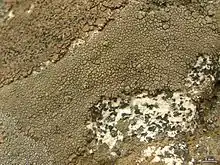Aspicilia phaea
Aspicilia phaea (dusky sunken disk lichen) is a grayish brown to tan areolate crustose lichen commonly found on rock in coastal to inland parts of central and southern California. Described as new to science in 2007,[1]:227[2] it is endemic to (only found in) California.[3] It grows on exposed or partially shaded siliceous rock, with a few known occurrences on serpentine rock.[2]
| Aspicilia phaea | |
|---|---|
 | |
| Scientific classification | |
| Kingdom: | |
| Division: | |
| Class: | |
| Order: | |
| Family: | |
| Genus: | |
| Species: | A. phaea |
| Binomial name | |
| Aspicilia phaea Owe-Larss. & A.Nordin (2007) | |
In rare cases full areolas do not form, and it appears as being cracked (rimose).[1][2] There are often grayish or whitish spots on the areolas.[2] The thallus is 2–8 cm in diameter, and 0.1– 1.2 mm thick.[2] The areolas are irregularly sized and angular, giving the lichen body (thallus) the appearance of a mosaic of small polygons.[1][2] A rim of dark tissue (prothallus) may surround the edges of the lichen.[1][2] The fruiting body parts (apothecia) are flat to concave (especially in the thallus center), and slightly immersed in the thallus, appearing as sunken round to polygonal discs, often with a grey or white rim of thalline tissue.[1][2] Lichen spot tests are all negative (K-, C-, KC-, P-).[1][2]
The photobiont is a chlorococcoid.[2] In Joshua Tree National Park, it is commonly found to be infected with Lichenostigma, a genus or lichenicolous fungi (fungi that are parasitic on lichens).[3]
References
- Field Guide to California Lichens, Stephen Sharnoff, Yale University Press, 2014, ISBN 978-0-300-19500-2
- Lichen Flora of the Greater Sonoran Desert Region. Vol 3, Nash, T.H., Ryan, B.D., Gries, C., Bugartz, F., (eds.) 2001,
- The Lichen Flora of Joshua Tree National Park An Annotated Checklist, Kerry Knudsen, Mitzi Harding, Josh Hoines, National Park Service,